Uncategorized
In Orthodox communities where women don’t read Torah, Purim offers a rare opportunity
(JTA) — When Alyza Lewin became a bat mitzvah in 1977, the fact that she had a ritual ceremony at all was still relatively revolutionary in Orthodox circles. But she took the rite of passage a step further, and did something that, for Orthodox Jews at the time, was considered the exclusive province of men.
She chanted the Scroll of Esther, known as the megillah, in front of a mixed-gender audience in suburban Washington, D.C. on the festival of Purim. Among the crowd were her grandfathers, who were both Orthodox rabbis. Lewin was the eldest of two daughters, and her father wanted to find a ritual she would be allowed to perform while remaining within the bounds of traditional Jewish law.
“My father, when it came time for the bat mitzvah, was trying to figure out what was something meaningful that a young woman could do,” she said. “So he decided: My Hebrew birthday is four days before Purim — he would teach me how to chant Megillat Esther.”
For many modern Orthodox women more than four decades later, women’s megillah readings have moved from the cutting edge to squarely within the norm. The increasing number of women’s readings is an indication of the growth of Orthodox feminism — and its concrete expression in Jewish ritual.
According to the Jewish Orthodox Feminist Alliance, at least 105 women-led megillah readings, for both mixed-gender and women-only audiences, are taking place worldwide this year. In 2019, according to JOFA, the number hit a peak of 139, up at a relatively steady pace from 63 in 2012, when the group began collecting data. The number of readings dipped last year due to COVID-19 precautions, but JOFA expects this year’s total to come close to the pre-pandemic high once congregations get around to notifying the organization of their events.
JOFA’s executive director, Daphne Lazar Price, said she had observed but did not quantify a related phenomenon where she’s seen “tremendous growth:” girls marking their bat mitzvahs with megillah readings, as Lewin did.
“Instead of a traditional Torah reading service or women’s tefillah [prayer] service or a partnership minyan service, we’ve seen a lot more… girls read, in part or the entire, Megillat Esther,” Price said.
Alyza Lewin’s personal megillah scroll cover is embroidered with an image of Mordecai being led on a horse by Haman on one side, and her name on the other side. (Photos courtesy of Alyza Lewin. Design by Jackie Hajdenberg)
Although traditional Jewish law, or halacha, obligates women to hear the megillah on par with men, many more traditionalist Orthodox communities still do not hold women’s megillah readings. Some Orthodox rabbis may believe that women need to hear the scroll chanted but should not themselves chant the scroll. Another objection stems from the idea that synagogues should gather the largest audience possible to hear the megillah, rather than fragment the crowd into smaller readings.
Still others worry that a women’s megillah reading will act as a sort of gateway to non-Orthodox practice more broadly. Gender egalitarianism is one of the principal dividing lines between Orthodoxy and more liberal Jewish movements, and some Orthodox rabbis say women who organize a megillah reading of their own may then venture into chanting Torah or leading public prayers, which women in the vast majority of Orthodox communities are not allowed to perform.
“The fear is, if we give a little, it’s a slippery slope and once we allow women’s megillah readings people intentionally will manipulate or maybe even accidentally just get confused,” said Rabbi Dovid Gottlieb, an Israeli Orthodox rabbi formerly based in Baltimore, describing some rabbis’ concerns regarding women’s megillah readings in a lecture last month surveying a range of perspectives on the topic. “If women’s megillah readings are OK, then women’s Torah reading is OK, then women rabbis are OK and before you know it, I don’t know what.”
In recent years, a growing number of Orthodox women rabbinic leaders have weighed in on the question as well. Maharat Ruth Friedman, a spiritual leader at the Orthodox congregation Ohev Sholom: The National Synagogue in Washington, D.C., said women reading megillah may feel more acceptable to Orthodox communities that see women’s performance of other rituals as a step too far away from Orthodoxy.
“It is kind of the one semi-kosher or kosher thing that women in more [religiously] right-wing communities can do,” Friedman said. “It doesn’t necessarily mean that the rabbis allow them to meet in the synagogue space, but at least that there is a contingent of women who will go to them.”
In some communities, women’s megillah readings might take place in private homes or in other spaces outside the synagogue. Some Orthodox rabbis permit women to read the megillah for other women, but prohibit it in front of men.
The idea of feminist megillah readings has become so mainstream that it was a storyline on “Shababnikim,” an Israeli comedy series about renegade haredi Orthodox yeshiva students. One of them is alarmed by his fiancee’s determination to read the megillah for a group of women and barges in to stop the reading. He later decides that despite his discomfort he should be more flexible in the future, within the constraints of Orthodox law, to make the woman he loves feel respected.
As women’s megillah readings have increased in popularity, they have reached the farthest parts of the globe, even reaching as far south as Antarctica. (Courtesy of Raquel Schreiber via JOFA)
At the Hebrew Institute of Riverdale, a liberal Orthodox synagogue in New York City, women have been reading megillah for decades. Founding Rabbi Avi Weiss wrote a Jewish legal analysis explaining why women are permitted to read the scroll in 1998.
“I personally am someone who advocates, and in our synagogue community looks to expand, women’s roles and give more opportunities for women,” said the synagogue’s current senior rabbi, Steven Exler.
Lewin is also watching the practice expand at her synagogue, Washington, D.C.’s Kesher Israel Congregation, where women have read from the megillah for nearly three decades. This year, she’s reading the fewest chapters of the megillah she has ever read. She usually reads half of the scroll, including a difficult passage in the ninth chapter. But for this week’s women’s reading at her synagogue, a new volunteer signed up to chant the ninth chapter.
Still, despite her pioneering reading at age 12, and her decades of chanting, Lewin has encountered the Orthodox community’s ambivalence around women and megillah firsthand. For many years, she borrowed her father’s scroll when Purim came around. But about eight years ago, Lewin asked him for her own scroll as a gift, which can cost upwards of $1,800.
Lewin’s father traveled to Israel to find a scribe to commission the megillah. But he wasn’t comfortable telling the scribe the megillah would go to a woman, and instead said it was a gift for his son-in-law.
Years later, Lewin was at a wedding where she met the scribe who wrote her treasured megillah, and revealed to him that the scroll belonged to her.
“He was thrilled,” Lewin said. “I think it was his individual personality. There are some individuals who are very supportive of the increase in opportunity for women, that women are becoming much more learned in terms of Jewish law.”
—
The post In Orthodox communities where women don’t read Torah, Purim offers a rare opportunity appeared first on Jewish Telegraphic Agency.
Uncategorized
A border official mocked an attorney for observing Shabbat. Orthodox lawyers say the issue is not new.
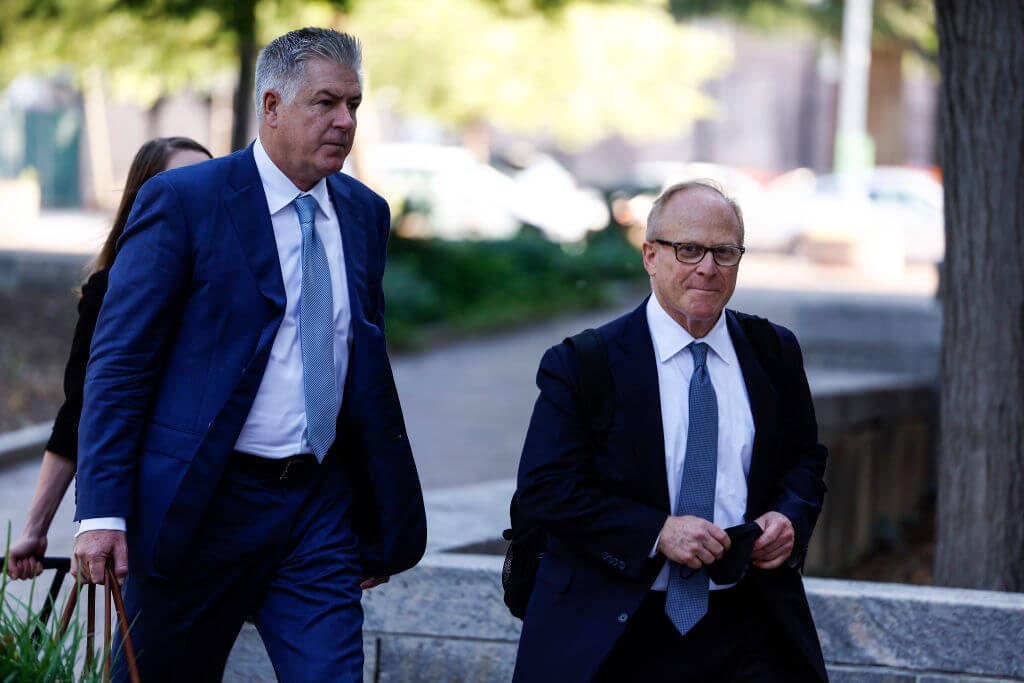
Gregory Bovino, the Border Patrol official who led immigration raids in Minneapolis, reportedly mocked the Jewish faith of Minnesota’s U.S. attorney during a phone call with other prosecutors in mid-January. According to The New York Times, Bovino complained that Daniel Rosen, an Orthodox Jew, was hard to reach over the weekend because he observes Shabbat and sarcastically pointed out that Orthodox Jewish criminals don’t take the weekends off.
The call took place at a moment of extreme tension in Minneapolis, as federal agents under Bovino’s command carried out an aggressive immigration crackdown that had already turned deadly. It came between the fatal shootings of Renée Good and Alex Pretti, both killed during enforcement operations, and amid fierce backlash from local officials and residents.
Bovino made the remarks in a derisive, mocking tone, the Times reported, casting Shabbat observance as a point of ridicule. Bovino had already drawn national attention for frequently wearing an olive double-breasted greatcoat with World War II-era styling, leading some critics to call him “Gestapo Greg” and accusing him of “Nazi cosplay.” Bovino, who pushed back on those comparisons, has since been reassigned.
Rosen, a Trump nominee, was confirmed as Minnesota’s U.S. attorney in October 2025 after a career in private practice and Jewish communal leadership. He has said that rising antisemitism helped motivate his decision to take the job, and that prosecuting hate crimes would be a priority for his office.
For many Orthodox Jewish lawyers, Bovino’s alleged remarks were not surprising. They echoed a familiar challenge: explaining that Shabbat — a full day offline — is not a lack of commitment, but a religious boundary that cannot be bent without being broken.
In a profession that prizes constant availability, that boundary can carry consequences. Some lawyers say it shows up in subtle ways: raised eyebrows, jokes about being unreachable, skepticism when they ask for time off. Others say it has shaped much bigger decisions, including how visibly Jewish they allow themselves to be at work.
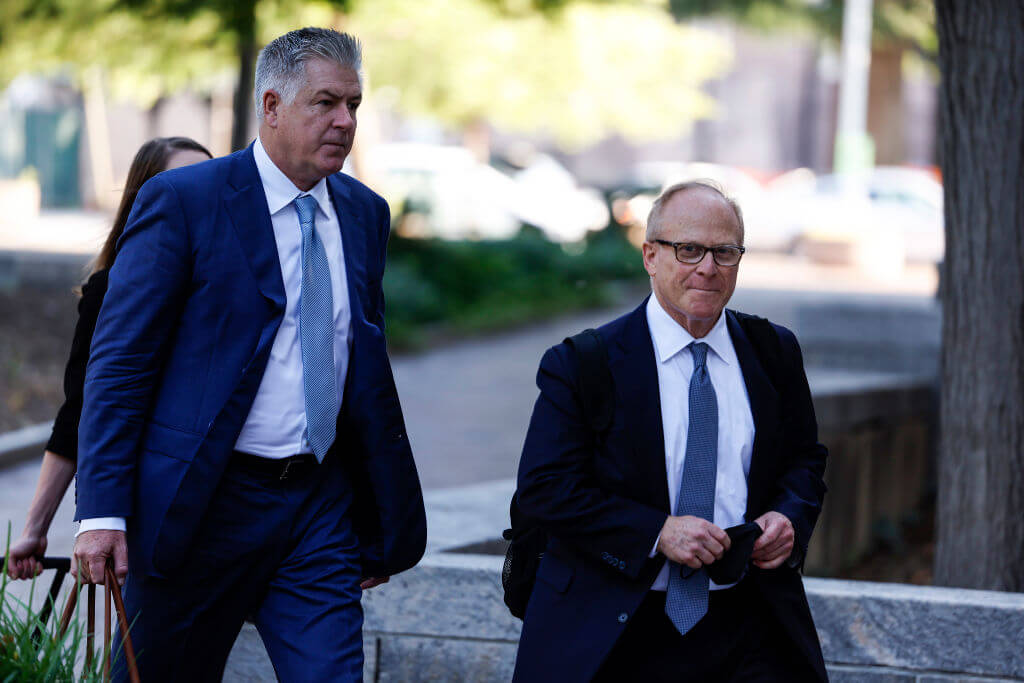
David Schoen, an Orthodox criminal defense attorney who served as lead counsel for President Donald Trump during his second impeachment trial, said he has long been mindful of how religious observance is perceived in the courtroom.
“I have made a conscious decision not to wear my yarmulke in front of a jury,” Schoen said, explaining that jurors often “draw stereotypes from what they see.”
Those concerns were reinforced by experience. Schoen said he has noticed a “definite difference in attitude” from some judges depending on whether he wore a yarmulke. In one case, he recalled, a Jewish judge pulled him aside during a jury trial and told him she thought he had made the right choice — a comment Schoen said he found disappointing.
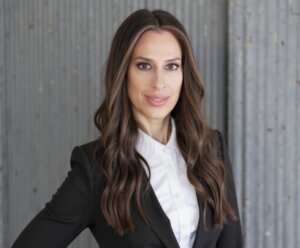
For Sara Shulevitz, a criminal defense attorney and former prosecutor, the Bovino episode brought back memories from early in her career.
Orthodox and the daughter of a Hasidic rabbi — now married to one — Shulevitz said her unavailability on Jewish holidays was often treated as a professional flaw rather than a religious obligation. “It held me back from getting promotions,” she said.
In court, the scrutiny could be blunt. “I was mocked by a Jewish judge for celebrating ‘antiquated’ Jewish holidays,” she said, recalling requests for continuances for Shemini Atzeret and Simchat Torah. In another case, she said, a judge questioned her request for time off for Shavuot and suggested she had already “taken off for Passover.”
When another judge assumed Passover always began on the same day in April, “I had to explain the Jewish lunar calendar in the middle of court while everyone was laughing,” she said.
Not every encounter, Shulevitz added, was rooted in hostility. Sometimes judges simply didn’t understand Orthodox practice. When she explained she couldn’t appear on a Jewish holiday, judges would suggest she join the hearing by Zoom — forcing her to explain that Orthodox Jews don’t use electrical devices on Shabbat or festivals.
The misunderstanding often slid into a familiar assumption. “They think you’re lazy,” she said. “It’s not laziness. Any Jewish woman knows how much work goes into preparing for Passover.”
Rabbi Michael Broyde, a law professor at Emory University who studies religious accommodation, said that Bovino’s alleged “derogatory remarks” are “sad and reflects, I worry, the antisemitic times we seem to be living in.”
He added that the criticism of Rosen reflected a basic misunderstanding of how law offices operate, calling it “extremely rare” for a lawyer’s religious practices to interfere with their obligations, especially when senior attorneys delegate work and courts routinely grant continuances.
“No one works 24/7,” Broyde said.
The episode echoed a similar Shabbat-related incident during Trump’s first term. In his 2022 memoir, former Trump trade adviser Peter Navarro described how a group sought to undermine Trump son-in-law Jared Kushner’s role in the 2020 campaign by scheduling a key White House meeting with Trump on a Saturday, knowing Kushner — who is Shabbat observant — would not attend. Navarro titled the chapter recounting the episode, “Shabbat Shalom and Sayonara.”
The tension between Jewish observance and public life is not new. Senator Joe Lieberman, the first observant Jew to run on a major-party presidential ticket, famously walked to the Capitol for a Saturday vote and ate fish instead of meat at receptions. His longtime Senate colleague Chris Dodd joked that he became Lieberman’s “Shabbos goy.”
Still, Schoen said, visibility can cut both ways. During Trump’s impeachment trial, while speaking on the Senate floor, he reached for a bottle of water and instinctively paused. With one hand holding the bottle, he used the other to cover his head — a makeshift yarmulke — before drinking.
The moment was brief, but it did not go unnoticed. In the days that followed, Schoen said he heard from young Jewish men and businesspeople who told him that seeing the gesture made them feel more comfortable wearing their own yarmulkes at work.
The attention, he said, was unexpected. But for some in the Orthodox community, it became a source of pride.
“I felt honored,” Schoen said.
My guess in all seriousness is that he normally wears a yarmulke and this was reflex. Schoen is modern Orthodox so that would make sense. But I defer to @jacobkornbluh https://t.co/MkKx6W03v2
— Jake Tapper 🦅 (@jaketapper) February 9, 2021
Jacob Kornbluh contributed additional reporting.
The post A border official mocked an attorney for observing Shabbat. Orthodox lawyers say the issue is not new. appeared first on The Forward.
Uncategorized
Deni Avdija becomes first Israeli to be selected as an NBA All-Star
(JTA) — Portland Trail Blazers star Deni Avdija’s meteoric rise has officially reached a new stratosphere, as the 25-year-old forward has become the NBA’s first-ever Israeli All-Star.
Avdija was named an All-Star reserve for the Western Conference on Sunday, an expected but deserved nod after the northern Israel native finished seventh in All-Star voting with over 2.2 million votes, ahead of NBA legends LeBron James and Kevin Durant. Avdija’s breakout performance this season has earned him repeated praise from James and others across the league.
Avdija’s star turn began last year in his first season with Portland, when he further captured the adoration of Jewish fans across Israel and the U.S. But he took another step forward this season, averaging 25.8 points, 6.8 assists and 7.2 rebounds per game. His points and assists clips are by far the best of his career, and rank 13th and 12th in the NBA, respectively. He’s considered a front-runner for the league’s Most Improved Player award.
For close observers of Israeli basketball, Avdija’s All-Star selection is the culmination of a promising career that began as a teenage star with Maccabi Tel Aviv and made him the first Israeli chosen in the top 10 in an NBA draft.
“Deni Avdija being named an NBA All-Star reserve is an unbelievable achievement in the mind of every Israeli basketball fan,” Moshe Halickman, who covers basketball for the popular Sports Rabbi website, wrote in an essay for the Jewish Telegraphic Agency. “This is a dream come true for many — a dream that became realistic and even a must-happen during his breakout season — but something that in his first five seasons in the NBA never came across as something that was going to be real.”
Halickman, who has covered Avdija in Washington, D.C., and in Israel, wrote that Avdija is not only considered the greatest Israeli hooper of all time, but perhaps the best athlete to come out of Israel, period.
Oded Shalom, who coached Avdija on Maccabi Tel Aviv’s Under-15 and Under-16 teams, echoed that sentiment in a recent profile of Avdija in The Athletic.
“Even though he is only 25, I think he is Israel’s most successful athlete in history,’’ Shalom said. “We’ve had some great gymnasts — and I hope everyone forgives me for saying it, because we’ve had some great athletes — but I think Deni has become the greatest.”
Avdija’s ascension has also come against the backdrop of the Gaza war and a reported global rise in antisemitism, which he has said affects him personally.
“I’m an athlete. I don’t really get into politics, because it’s not my job,” Avdija told The Athletic. “I obviously stand for my country, because that’s where I’m from. It’s frustrating to see all the hate. Like, I have a good game or get All-Star votes, and all the comments are people connecting me to politics. Like, why can’t I just be a good basketball player? Why does it matter if I’m from Israel, or wherever in the world, or what my race is? Just respect me as a basketball player.”
Now, Avdija’s talents will be on display at the NBA All-Star Game, on Sunday, Feb. 15, in Los Angeles.
The post Deni Avdija becomes first Israeli to be selected as an NBA All-Star appeared first on The Forward.
Uncategorized
Democratic leader says GOP-led Congress boosted ICE funding while Jewish security is underfunded
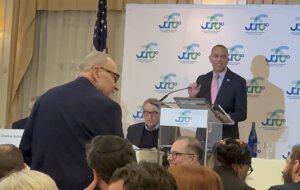
House Democratic Leader Hakeem Jeffries used a Jewish gathering in New York on Sunday to spotlight what he described as an imbalance in federal priorities, building on outrage over the Trump administration’s violent crackdown in Minneapolis that resulted in two fatal shootings.
Jeffries criticized the Republican-controlled Congress for boosting immigration enforcement funding by billions while, he said, security funding for Jewish institutions continues to lag amid rising antisemitic threats. He said that in the One Big Beautiful Bill Act, which passed last July and included cuts to Medicaid, the Department of Homeland Security received an additional $191 billion, including $75 billion for ICE.
“If that can happen, then the least that we can do is ensure that this vital security grant program is funded by hundreds of millions of dollars more to keep the Jewish community and every other community safe,” Jeffries said.
The Nonprofit Security Grant Program, established by Congress in 2005 and administered by FEMA under the Department of Homeland Security, provides funding to nonprofits, including houses of worship, to strengthen security against potential attacks. Congress began significantly increasing funding in 2018 after a wave of synagogue attacks nationwide, bringing the program to $270 million today.
Major Jewish organizations are pushing to raise funding to $500 million amid rising antisemitic threats. Last year, the Trump administration briefly froze the program as part of broader agency cuts, and some groups have been reluctant to apply because applicants must affirm cooperation with federal immigration enforcement.
Jeffries said House Democrats strongly support an increase to $500 million annually to meet escalating security needs. “It’s got to be an American issue, because that is what combating antisemitism should be all about,” he said.
The breakfast, previously held at the offices of the UJA-Federation of New York, was held this year for the first time in the events hall at Park East Synagogue, which was the site of a pro-Palestinian protest last year that featured antisemitic slogans and posters.
Sunday’s program also included remarks from Senate Minority Leader Chuck Schumer, who told the audience that his support for Jewish security funding will only continue growing under his leadership, calling it his “baby.”
“As long as I’m in the Senate, this program will continue to grow from strength to strength, and we won’t let anyone attack it or undo it,” Schumer said.
Rep. Jerry Nadler, the co-chair of the Congressional Jewish Caucus who is retiring at the end of the year after 36 years in the House, also spoke at the event. Nadler, like several other Democrats in recent months, compared the actions of ICE agents to the Gestapo, Nazi Germany’s secret police. The comparison has drawn sharp criticism from Democrats, Republicans and Jewish leaders.
Support for Israel aid
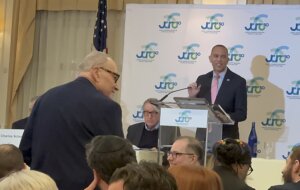
Both Schumer and Jeffries vowed in their remarks to continue supporting U.S. military assistance to Israel, amid increasing calls within the party for sharper opposition to Israel. Polls show that Democratic voters are increasingly sympathetic to Palestinians. In July, a record 27 Senate Democrats, a majority of the caucus, supported a pair of resolutions calling for the blocking of weapons transfers to Israel.
“I think it’s the humane thing to do to ensure that Israel has a right to exist as a Jewish and democratic state and eternal homeland for the Jewish people,” Jeffries said. The House Minority Leader, who has cultivated close ties with Jewish leaders since his election in 2012, noted that he has visited Israel nine times. He recalled that on his recent trip, Israel’s ambassador to the U.S., Yechiel Leiter, joked that it might be time for Democrats to buy property in Jerusalem.
Schumer, the nation’s highest-ranking Jewish elected official, has seen his popularity decline and has faced calls to step down from his role as leader. On Sunday, he pledged that he “will always fight to give Israel what it needs to protect itself from the many who want to wipe Israel off the face of the map.”
The post Democratic leader says GOP-led Congress boosted ICE funding while Jewish security is underfunded appeared first on The Forward.


